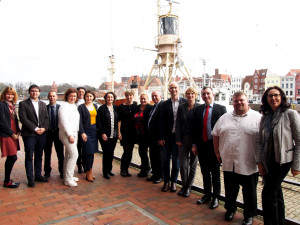ELISE: Spurring innovation eco-systems

Image: Project partners during kick-off in Lubeck 15 March, 2017
ELISE is the acronym for an Interreg funded project that launched operations with a kick-off meeting in Lubeck, Rostock, and Greifswald last week: European Life Science Ecosystems. The project’s eight partners believe in regional cross-sectoral cooperation platforms to promote knowledge transfer and collaboration, not only between academia and industry, but also including consumers and public bodies.
With research and development becoming steadily more complex, innovation processes increasingly demand for cross-sectoral expertise. So-called innovation ecosystems are viewed as one promising approach to help moderate those complex interdependencies. These systems serve as exchange and cooperation platforms for research and industry even involving policy making bodies and society.
For ELISE eight regional clusters (BioCon Valley-Initiative, Cassovia Life Sciences, Centre-Val de Loire, Emilia-Romagna Region, Košice Region, Cluster Life Science Nord, Technical University Kaunas, Voivode ship Lubelskie) are cooperating to assess strengths and weaknesses in regional innovation strategies and to foster the generation of regional and cross-regional innovation ecosystems in life sciences and health.
On March 14-16, 2017 the project partners met for the project kick-off. On a study tour through the North-German life science and health clusters in Lubeck, Rostock, and Greifswald the participants visited several research institutions and companies and met with regional innovation supporting institutions to get to know instruments and technology transfer structures.












